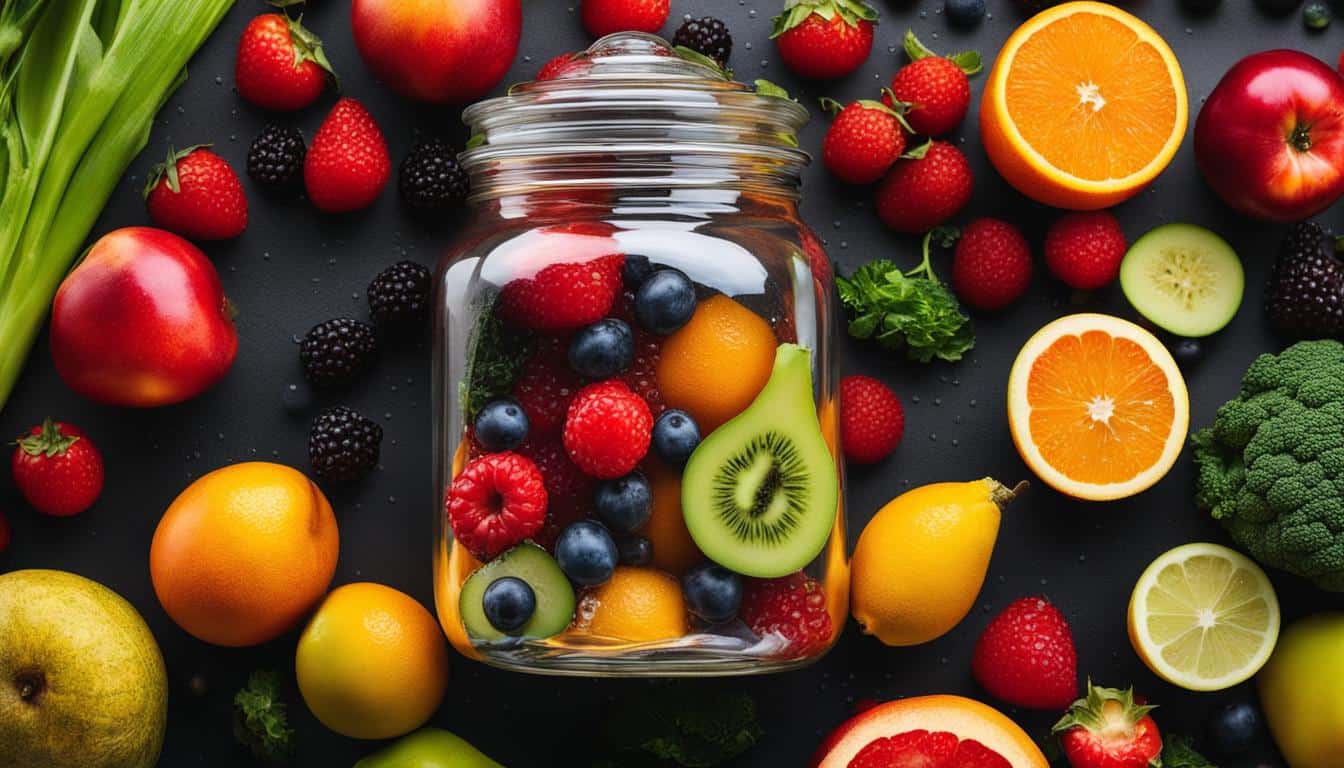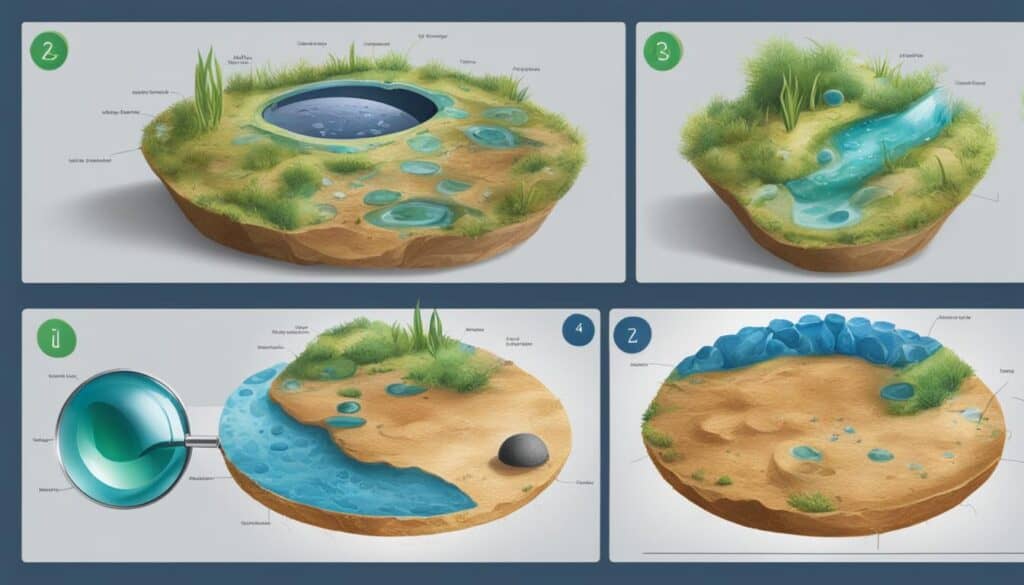
Revitalize Skin with Cell Turnover and Hydration. Having healthy and well-hydrated skin is the key to achieving a radiant and youthful complexion. Our skin naturally goes through a process called ‘skin cell turnover’, which is the shedding of old skin cells and the production of new ones.
This process is essential for maintaining skin health, as it aids in the repair of damaged skin and promotes a more even skin tone. In addition to skin cell turnover, skin hydration is equally important for keeping skin smooth, plump, and glowing. Hydration helps to prevent dryness, flakiness, and other skin concerns that can make skin look dull and lifeless.
Create an image showing the lifecycle of a skin cell, starting with a dry, dull-looking cell and ending with a plump, hydrated one. Include elements such as a magnifying glass to show the details of the cells, and use colors such as blue and green to represent the hydration process.
Key Takeaways:
- Skin cell turnover is a natural process that promotes healthier skin.
- Hydration helps to keep skin smooth, plump, and glowing.
- Natural exfoliation methods can enhance skin cell turnover.
- Tips for skin hydration include drinking plenty of water and using moisturizing products.
- Both skin cell turnover and hydration are essential for achieving and maintaining healthy-looking skin.
Understanding Skin Cell Turnover
In order to promote healthy and radiant skin, it is crucial to understand the process of skin cell turnover. This term refers to the rate at which the skin sheds dead cells and replaces them with new ones. As we age, skin cell turnover naturally slows down, which can lead to a dull and lackluster complexion.
Cellular regeneration is a key aspect of skin cell turnover that involves the formation of new skin cells. This process is vital for maintaining the overall health and appearance of the skin. A crucial factor that affects cellular regeneration is exfoliation, which helps to remove dead skin cells and stimulate skin renewal.
Exfoliation can be achieved through a variety of methods, including chemical exfoliants that use alpha-hydroxy acids (AHAs) or beta-hydroxy acids (BHAs) to break down the bonds between dead skin cells, and physical exfoliants such as scrubs and brushes that physically buff away dead skin cells.
Regular exfoliation can prevent pore-clogging and promote cellular regeneration, resulting in a brighter, clearer, and more youthful complexion. However, it is important to avoid over-exfoliating, since this can cause irritation and damage to the skin barrier.
Key Takeaways:
- Skin cell turnover is the process of shedding dead skin cells and replacing them with new ones.
- Cellular regeneration is the formation of new skin cells and is crucial for skin health and appearance.
- Exfoliation is essential for promoting skin renewal.
- Both chemical and physical exfoliation methods can help to boost skin cell turnover.
- Over-exfoliating can damage the skin barrier, so it is important to use exfoliants in moderation.
Boosting Skin Cell Turnover
Regular exfoliation is key to maintaining youthful and radiant skin. It helps to remove dead skin cells, dirt and other impurities, allowing new, healthy cells to emerge. But with so many exfoliation methods available, it can be challenging to choose the right one for your skin type. In this section, we explore different exfoliation techniques and offer tips for boosting skin cell turnover naturally.
Natural exfoliation methods
Natural exfoliation methods are ideal for those with sensitive skin. They are gentle yet effective and do not cause any irritation or damage. Some popular natural exfoliants include:
- Oatmeal – it gently removes dead skin cells, leaving the skin soft and smooth.
- Almonds – ground almonds are a great physical exfoliant that helps to buff away dead skin cells without causing any damage.
- Fruit enzymes – many fruits, such as papaya and pineapple, contain natural enzymes that help to break down dead skin cells and improve skin texture.
Chemical exfoliation methods
Chemical exfoliation involves the use of acids, such as alpha-hydroxy acids (AHAs), beta-hydroxy acids (BHAs), and enzymes, to remove dead skin cells. Here are some popular chemical exfoliants:
- Glycolic acid – it helps to smooth out fine lines and wrinkles and improve skin texture.
- Salicylic acid – it is ideal for those with oily or acne-prone skin. It helps to unclog pores and prevent breakouts.
- Enzyme peels – they use natural enzymes to exfoliate the skin gently. They are ideal for those with sensitive skin.
“Regardless of the method, it is important to exfoliate regularly to maintain healthy and glowing skin.”
It is essential to choose the right exfoliation method for your skin type and avoid over-exfoliating, as it can damage the skin’s natural barrier function. Always follow up with proper hydration and moisturization to ensure your skin remains healthy and glowing.
The Importance of Hydration
Water is essential for skin health, as it helps to maintain optimal hydration levels and natural balance. When the skin is well-hydrated, it feels plump and elastic, looks radiant, and is less prone to dryness, flaking, or dullness. To ensure your skin stays hydrated, follow these skin hydration tips:
- Drink plenty of water every day to keep your body hydrated from the inside out.
- Choose hydrating skincare products, such as moisturizers, serums, and masks, to provide external moisture to the skin.
- Protect your skin from harsh environmental factors, such as wind, sun, and pollution, that can strip the skin of its natural moisture.
To assess your hydration levels and identify any potential issues, you may want to consult a dermatologist or skincare professional. Keeping your skin well-hydrated is one of the best ways to prevent signs of aging, maintain skin health, and promote a youthful, glowing complexion.
Skin Hydration Tips:
| Tip | Description |
|---|---|
| Drink water | At least 8 glasses of water per day helps maintain skin health from the inside out. |
| Use a humidifier | If you live in a dry climate or feel the air is too dry indoors, a humidifier can add moisture to the air and help hydrate your skin. |
| Avoid hot water | Hot water can strip the skin of natural oils and cause dryness. Use lukewarm water instead. |
| Apply moisturizer to damp skin | Moisturizer is most effective when applied to damp skin, as it helps lock in moisture. |
| Choose hydrating ingredients | Look for skincare products that contain hydrating ingredients, such as hyaluronic acid, glycerin, and ceramides, to provide additional moisture to the skin. |
Enhancing Skin Hydration
In addition to understanding the importance of hydration for skin health, there are practical ways to enhance skin hydration levels. Moisturization is a key factor in maintaining well-hydrated skin.
TIP: Look for moisturizers that contain humectant ingredients, such as hyaluronic acid, glycerin, or urea. These ingredients attract water to the skin and help it to retain moisture.
It’s also important to keep the skin barrier function healthy, as a compromised barrier can lead to dehydration.
TIP: Use gentle, fragrance-free cleansers and avoid over-exfoliation, as this can strip the skin of natural oils. Incorporating a hydrating serum or facial oil into your skincare routine can also boost moisturization levels.
The Benefits of Moisturization
There are numerous benefits to keeping the skin well-moisturized. Moisturization can improve the overall texture and appearance of the skin, reducing the appearance of fine lines and wrinkles. It can also promote a healthy skin barrier function and protect against environmental stressors.

Remember, staying well-hydrated is just one piece of the puzzle in maintaining healthy and youthful skin. By incorporating moisturization and other skin hydration tips into your skincare routine, you can promote optimal skin health and maintain a glowing complexion.
The Link Between Skin Cell Turnover and Hydration
There is a strong connection between skin cell turnover and hydration. Skin cell turnover is the natural process of shedding dead skin cells and replacing them with new ones. When this process is functioning properly, it promotes cellular regeneration, resulting in a smoother, brighter, and more youthful complexion.
However, for skin cell turnover to occur effectively, the skin needs to be adequately hydrated. Without proper hydration, the skin’s natural exfoliation process can become impaired, leading to a buildup of dead skin cells on the surface. This can result in a dull, rough, and aged appearance.
To maintain optimal hydration levels in the skin, it is essential to drink plenty of water and use products that help to lock in moisture. By boosting hydration levels, the skin’s natural cell turnover process is better able to function, resulting in a healthier and more radiant complexion.
Regular exfoliation is also key to promoting skin cell turnover and hydration. By removing dead skin cells from the surface of the skin, exfoliation helps to improve absorption of moisturizing products and promote better hydration. It also promotes cellular regeneration, resulting in a smoother and more youthful complexion.
In summary, skin cell turnover and hydration are closely intertwined. By ensuring adequate hydration levels and regular exfoliation, you can promote a healthier, more youthful complexion.
Maintaining Skin Health
When it comes to achieving healthy skin, there are several key factors to consider. One of the most important is maintaining a balance between skin cell turnover and hydration. If either of these factors is out of whack, it can lead to a variety of skin problems including dryness, dullness, and premature aging.
To maintain optimal skin health, it’s crucial to prioritize both skin cell turnover and hydration. This means implementing a skincare routine that includes regular exfoliation and moisturization.
When it comes to skin cell turnover, natural exfoliation is key. Regular exfoliation helps to slough off dead skin cells and promote cellular regeneration. However, it’s important to avoid over-exfoliation, which can damage the skin’s moisture barrier and lead to dryness and irritation.
To maintain optimal hydration, it’s important to drink plenty of water and apply moisturizer regularly. Look for products that contain ingredients like hyaluronic acid, which can help to lock in moisture and strengthen the skin’s protective barrier.
Additional Skin Hydration Tips:
- Avoid hot showers: Hot water can strip the skin of its natural oils, leading to dryness and irritation.
- Use a humidifier: Adding moisture to the air can help to keep skin hydrated, especially during the winter months.
- Eat a healthy diet: A diet that’s rich in fruits and vegetables can help to promote overall skin health and hydration.
“Maintaining a balance between skin cell turnover and hydration is crucial for achieving and maintaining healthy skin.”
Conclusion
It is clear that skin cell turnover and hydration are essential factors in achieving and maintaining healthy, radiant skin. By understanding the process of cellular regeneration and the benefits of regular exfoliation, individuals can take practical steps to boost skin cell turnover and promote skin renewal. Additionally, by keeping the skin well-hydrated through drinking water, using hydrating products, and maintaining a healthy skin barrier function, individuals can help to enhance skin hydration levels and achieve a more youthful complexion.
By focusing on skin cell turnover and hydration, individuals can take meaningful steps towards improving their overall skin health. By adopting healthy habits and incorporating tips and techniques into their daily skincare routine, individuals can enjoy vibrant, youthful-looking skin for years to come.
FAQ
What is skin cell turnover?
Skin cell turnover refers to the process by which old skin cells are shed and replaced with new ones. It is a natural and continuous process that allows for the regeneration and renewal of the skin.
How does skin cell turnover affect the skin?
Skin cell turnover plays a crucial role in maintaining healthy and youthful-looking skin. Proper turnover helps to slough off dead skin cells, unclog pores, improve skin texture, and promote a more even tone. It also aids in the production of collagen and elastin, which are essential for firmness and elasticity.
What is exfoliation, and how does it impact skin cell turnover?
Exfoliation is the process of removing dead skin cells from the surface of the skin. Regular exfoliation helps to stimulate skin cell turnover, allowing fresh and vibrant skin cells to come to the surface. This process can be achieved using physical exfoliants, such as scrubs and brushes, or through chemical exfoliants, such as alpha hydroxy acids (AHAs) and beta hydroxy acids (BHAs).
How can I boost skin cell turnover?
To boost skin cell turnover, it is important to incorporate regular exfoliation into your skincare routine. This can be done through the use of exfoliating cleansers, toners, or masks. It is essential to choose the appropriate exfoliation method and frequency based on your skin type and sensitivity.
Why is hydration important for the skin?
Hydration is vital for maintaining healthy skin. It helps to improve skin elasticity, promote a plump and youthful appearance, and enhance the overall health of the skin. Proper hydration also supports the skin’s natural barrier function, which helps to protect against environmental aggressors and maintain moisture levels.
How can I enhance skin hydration?
There are several ways to enhance skin hydration. One of the most important is by using moisturizers that contain hydrating ingredients such as hyaluronic acid and glycerin. Additionally, drinking an adequate amount of water, avoiding excessive sun exposure, and using a humidifier in dry environments can help keep the skin hydrated.
How does skin cell turnover impact skin hydration?
Skin cell turnover and hydration are closely linked. A healthy and efficient cell turnover process allows for better absorption of hydrating ingredients and helps to maintain optimal moisture levels in the skin. In turn, well-hydrated skin can support the skin cell turnover process, allowing for continuous renewal and regeneration.
What are the key factors to consider for maintaining skin health?
To maintain skin health, it is crucial to focus on both skin cell turnover and hydration. This can be achieved through regular exfoliation, moisturization, and maintaining a healthy diet and lifestyle. Additionally, protecting the skin from harmful UV rays and implementing a consistent skincare routine tailored to your skin type can contribute to overall skin health.
RELATED POSTS: Skin Cell Turnover for Effective Sun Damage Repair








